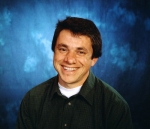
doc@warart.com
Nicolas Trudgian
Nicolas Trudgian
Having graduated from art college, Nicolas Trudgian spent many years as a professional illustrator before turning to a career in fine art painting. His crisp style of realism, attention to detail, compositional skills and bright use of colours, immediately found favour with collectors and demand for his original work soared on both sides of the Atlantic. Today, more than a decade after becoming a fine art painter, Nicolas Trudgian is firmly established within a tiny, elite group of aviation artists whose works are genuinely collected world-wide.
When he paints an aircraft you can be sure he has researched it in every detail and when he puts it over a particular airfield, the chances are he has paid it a recent visit. Even when he paints a sunset over a tropical island, or mist hanging over a valley in China, most probably he has seen it with his own eyes.
Nick was born and raised in the seafaring city of Plymouth, the port from which the Pilgrim Fathers set sail in 1620, and where Sir Francis Drake played bowls while awaiting the Spanish Armada. Growing up in a house close to the railway station within a busy military city, the harbour always teeming with naval vessels and the skies above resonating with the sounds of naval aircraft, it was not at all surprising the young Nick became fascinated with trains, boats and aircraft.
It was from his father, himself a talented artist, that Nick acquired his love of drawing and surrounded by so much that was inspiring, there was never a shortage of ideas for pictures. His talent began to show at an early age and although he did well enough at school, he always spent a disproportionate amount of time drawing. People talked about him becoming a Naval officer or an architect but in 1975 Nick's mind was made up. When he told his careers teacher he wanted to go to art school the man said, 'Now come on, what do you really want to do?"
After leaving school Nick began a one-year foundation course at the Plymouth College of Art. Now armed with an impressive portfolio containing paintings of jet aircraft, trains, even wildlife, he was immediately accepted at every college he applied to join. He chose a course at the Falmouth College of Art in Cornwall specialising in technical illustration and paintings of machines and vehicles for industry. It was perfect for Nick, and he was to become one of the star pupils. One of the lecturers commented at the time: "Every college needs someone with a talent like Nick to raise the standards sky high; he carried all the other students along with him, and created an effect which will last for years to come." Two weeks after leaving art college Nick blew every penny he had on a trip to South Africa to ride the great steam trains across the desert, sketching them at every opportunity.
Returning to England, in best traditions of all young artists, he struggled to make a living. Paintings by an unknown artist didn't fetch much despite the painstaking effort and time Nick put into each work, so when the college he had recently left offered him a job as a lecturer, he jumped at the chance. The money was good and he discovered that he really enjoyed teaching.
Throughout the 1970s Nick was much involved with a railway preservation society near Plymouth and it was through the railway society that he had his first pictures reproduced as prints. But Nick felt he needed to advance his career and in summer 1985 Nick moved away from Cornwall to join an energetic new design studio in Wiltshire. Here he painted detailed artwork for many major companies including Rolls Royce, General Motors, Volvo Trucks, Alfa Romeo and, to his delight, the aviation and defence industries. He remembers the job as exciting though stressful, often requiring him to work right through the night to meet a client's deadline. Here he learned to be disciplined and fast.
Towards the end of the 1980's Nick had the chance to work for the Military Gallery. This was the break that for years he had been striving towards and with typical enthusiasm, flung himself into his new role. After completing a series of aviation posters, including a gigantic painting to commemorate the seventy-fifth anniversary of the Royal Air Force, Nick's first aviation scene to be published as a limited edition was launched by the Military Gallery in 1991. Despite the fact he was unknown in the field, it was an immediate success.
Over the past decade Nick has earned a special reputation for giving those who love his work much more than just aircraft in his paintings. He goes to enormous lengths with his backgrounds, filling them with interesting and accurate detail, all designed to help give the aircraft in his paintings a tremendous sense of location and purpose. His landscapes are quite breathtaking and his buildings demonstrate an uncanny knowledge of perspective but it is the hardware in his paintings which are most striking. Whether it is an aircraft, tank, petrol bowser, or tractor, Nick brings it to life with all the inordinate skill of a truly accomplished fine art painter.
A prodigious researcher, Nick travels extensively in his constant quest for information and fresh ideas. He has visited India, China, South Africa, South America, the Caribbean and travels regularly to the United States and Canada. He likes nothing better than to be out and about with sketchbook at the ready and if there is an old steam train in the vicinity, well that's a bonus!
